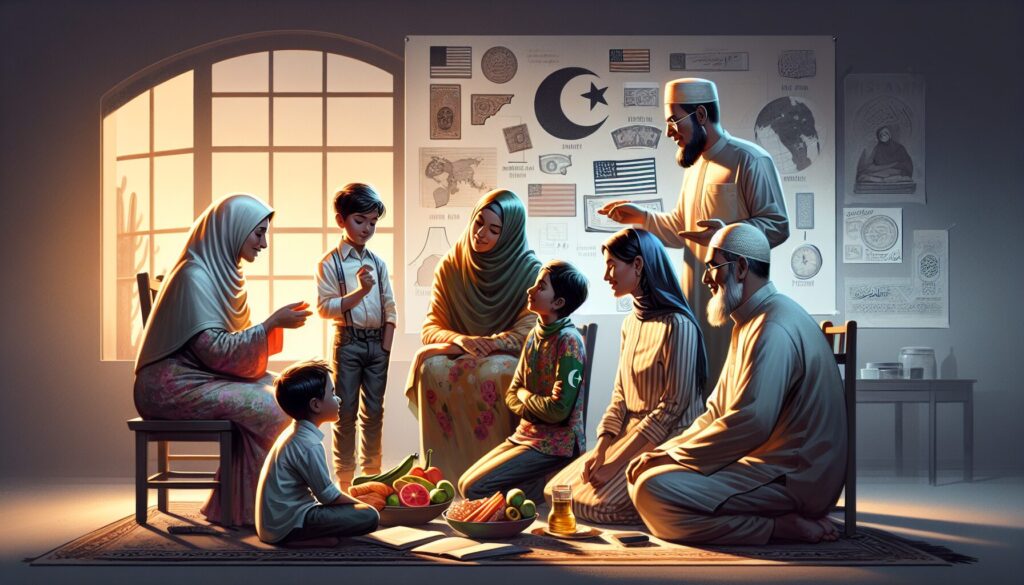Growing up, every Sunday in our household felt like a mini-holiday with a big roast feast where stories flowed as freely as the gravy, strengthening our family bonds. In New Zealand, where diverse landscapes mirror the variety of cultures, family traditions can range from beach picnics to Matariki celebrations, all creating a sense of belonging and continuity. These shared experiences connect us to past and future generations, providing an anchor of stability and identity in our fast-paced world. Research shows that family traditions play a crucial role in shaping lives by teaching values, offering comfort during challenging times, and enhancing communication and emotional connection. Incorporating traditions isn’t just about maintaining old customs; it’s about creating new ones that resonate with your family’s unique dynamic, whether planting a tree for significant events or enjoying a weekly game night. The key is consistency and the shared joy these rituals bring to everyone involved.
Psychological Benefits of Establishing Traditions

Creating family traditions offers a delightful escape from the hustle and bustle of everyday life. Let’s dive into the psychological benefits of these cherished rituals! They play a crucial role in fostering a sense of belonging and identity. You know that warm, fuzzy feeling you get when everyone gathers around the table for that annual family feast? That’s the magic of traditions at work!
When families establish traditions, it builds a framework for connection and stability. People thrive on predictability and knowing that every year, there’s a special day to celebrate, brings comfort. This sense of routine can reduce stress and anxiety, as it offers a reliable anchor in a sea of life’s uncertainties. From an Islamic perspective, this sense of stability is a blessing, as consistent family rituals can be a form of remembrance (dhikr), bringing tranquility to the heart. According to The New Zealand Psychological Society, these rituals help cement emotional bonds, making families more resilient.
Strengthening Emotional Bonds
Family traditions also significantly boost emotional well-being. They create shared experiences that bind members together. Consider how the annual Matariki celebrations not only honor the past but also bring families closer. By partaking in such activities, family members create memories that last a lifetime, reinforcing their emotional connections.
Moreover, traditions often involve storytelling, where family members recount past events or tales. This storytelling aspect helps pass down values and shared history, fostering a strong family identity. It’s like having a living library of your family’s legacy! The act of sharing these stories encourages communication and understanding among family members, which is invaluable for emotional health.
Traditions also provide opportunities for family members to express their roles and responsibilities within the group. Whether it’s Dad carving the roast lamb for an Eid feast or Mum leading the family in a special Dua, these roles are essential. They give individuals a sense of purpose and belonging, which is a fundamental human need. According to University of Auckland, feeling connected to others is a key component of mental well-being.
Let’s not forget the joy and happiness that traditions bring! Celebrating together, laughing, and simply being in each other’s company can elevate everyone’s mood. The anticipation leading up to these events can be just as thrilling as the event itself, offering a boost in spirits even before the day arrives.
These family traditions are more than just rituals; they’re the threads that weave the fabric of a family’s identity. The science behind family traditions shows they’re not just culturally important but crucial for psychological well-being, offering comfort, connection, and joy across generations.
How Traditions Strengthen Family Bonds
Traditions are like the glue that holds families together, fostering a sense of belonging and identity. They offer comfort and stability, especially in today’s fast-paced world. When families engage in these shared activities, they’re not just following rituals; they’re creating memories that bind them across generations.
Consider a family I know in Wellington, who celebrate Matariki by stargazing and sharing stories of their ancestors. This isn’t just a night under the stars; it’s a profound moment of connection. Such traditions provide a unique opportunity for family members to bond over shared experiences. It’s a time when everyone, from the youngest child to the oldest grandparent, feels part of something bigger.
The Psychological Impact of Traditions
The science behind family traditions showcases their effect on mental and emotional well-being. The New Zealand Psychological Society has highlighted how these rituals can reduce stress and foster a sense of security. When families come together for regular traditions, they create a supportive environment that promotes open communication and understanding.
Furthermore, engaging in traditions can boost self-esteem, particularly for children. They learn the value of family, responsibility, and teamwork. Research from the University of Auckland indicates that children who participate in family traditions often develop a stronger sense of identity and belonging. This foundation helps them navigate life’s challenges with confidence.
Let’s look at what makes traditions so effective at strengthening bonds:
- Shared Experiences: Participating in a tradition means everyone has a role, creating a shared narrative that builds connection.
- Consistency: Regular traditions provide a sense of predictability and stability, which is especially comforting for children.
- Communication: Traditions often involve storytelling or discussion, encouraging open dialogue and understanding.
Incorporating traditions into family life doesn’t have to be grand or elaborate. It could be as simple as a weekly Sunday roast or a family game night. The key is consistency and participation from all family members. If you’re looking for ideas, you might find inspiration in our article on creating memorable Islamic holiday traditions for families in the West.
Traditions are more than just customs; they’re powerful tools for building and maintaining strong family connections. By understanding the science behind them, we can appreciate their importance and make them a cherished part of our family lives.
Creating Traditions: A Step-by-Step Guide
Establishing family traditions can be as rewarding as discovering a secret treasure chest filled with joy and togetherness. By creating these traditions step-by-step, you can weave a vibrant tapestry of shared memories that will be cherished for years. Let’s dive into the process without further ado!
Start with a Spark
Every tradition begins with a simple idea or inspiration. Think about what brings your family joy. Is it a love for outdoor adventures, a passion for storytelling, or perhaps a culinary delight? Draw inspiration from everyday moments or seasonal events that resonate with your family. For instance, a family in Christchurch might start a tradition of beach picnics every Sunday during summer, bringing everyone together with sun, sand, and scrumptious snacks.
Once you’ve got an idea, involve the family in brainstorming sessions. This inclusion makes everyone feel valued and excited about the new tradition. You could even create a family board where everyone pins their ideas. It’s a lovely way to see what sparks joy for each member and ensures the tradition reflects everyone’s preferences.
Plan and Prepare
Planning is where the magic starts to take shape. Outline the steps needed to make the tradition a reality. Consider logistics like time, location, and resources. For example, if your tradition involves a monthly hike, research nearby trails and set dates that work for everyone. To keep things organized, a calendar or a digital planner can be a handy tool.
During this stage, it’s helpful to anticipate potential challenges. Maybe the weather is unpredictable, or the kids have busy schedules. The trick is to be flexible and adaptable while keeping the essence of the tradition intact. A great tip is to have a backup plan, like an indoor activity if the weather doesn’t cooperate.
Launch and Celebrate
Once the groundwork is laid, it’s time to launch your tradition. Make this first event special to set the tone for future gatherings. Capture the moments through photos or videos to create a visual record that can be cherished and shared. Incorporating a small ceremony or ritual, like a toast or a special song, can add an extra layer of meaning and make the occasion memorable.
After the event, gather feedback from family members. What did they enjoy most? Is there anything they’d like to change? This feedback is crucial for refining the tradition, ensuring it continues to be fun and meaningful. Over time, your family tradition will evolve, becoming a beloved part of your shared history.
Creating family traditions is like planting seeds that grow into a beautiful garden of memories. With a bit of planning and a lot of heart, you can cultivate a legacy of togetherness that everyone will treasure. Institutions like New Zealand Psychological Society and University of Auckland might even back me up on the benefits of these traditions in strengthening family bonds.
Examples of Memorable Family Traditions

Family traditions are the glue that binds us together, creating cherished memories that last a lifetime. Whether it’s a weekly family game night or an annual holiday celebration, these rituals often hold special meaning and bring a sense of belonging. Let’s dive into some unique examples of memorable family traditions that you might want to try.
First on the list is the delightful tradition of the Friday Night Dinner. Many families in New Zealand gather every Friday evening to share a meal, catching up on the week’s happenings. It’s more than just eating; it’s about connecting. The anticipation of these evenings can often get us through a tough week, knowing that warmth and laughter await. This tradition is a fantastic way to reinforce bonds and create a sense of unity.
Another heartwarming tradition is the Family Story Night. Imagine everyone gathered around, perhaps in the cozy glow of a fireplace, each person taking turns to share a story. These tales can be from family history, imaginative creations, or even retelling favorite books. This tradition not only strengthens family ties but also fosters a love for storytelling and encourages creativity in young minds.
Weekly Quran Story Night: Dedicate one evening a week to sharing a story from the Quran. You don’t need to be a scholar; you can read from a children’s book of Quran stories. This tradition not only teaches valuable lessons but also fills the home with blessings and connects the family to their spiritual heritage.
Now, let’s talk about a tradition that’s particularly close to my heart—Planting Day. Every year, on the first day of spring, families around New Zealand head to their gardens to plant something new. It’s a day to celebrate growth and renewal, both in nature and within the family. Watching those plants grow over the months is a beautiful reminder of the family’s journey together.
Creating Traditions with Purpose
Many families have traditions centered around the concept of giving back. Volunteering together at a local shelter or organizing a community clean-up day not only helps the community but also instills values of empathy and responsibility. Plus, it’s a wonderful way to spend quality time together. When families participate in these activities, they’re not just helping others; they’re also strengthening their own bonds through shared purpose.
Let’s not forget the joy of creating a family time capsule. Once a year, families can gather to choose small items, letters, or photos that represent their experiences and achievements from the past year. Sealing these treasures away to be opened in the future is like preserving a snapshot of their lives, offering a tangible link to the past when it’s reopened. This tradition can be a powerful way to reflect on growth and change over the years.
The science behind family traditions shows that they play a crucial role in providing a sense of identity and security. They help families cope with change and celebrate life’s milestones. Whether you choose to embrace one of these traditions or create your own, the important thing is to ensure that it’s meaningful to your family. And who knows? The tradition you start today could be cherished by generations to come.
Remember, the magic of family traditions lies in their ability to bring us closer, creating a tapestry of shared experiences that enrich our lives. Whether you’re inspired by the ideas above or come up with something entirely new, embrace the journey of making lasting memories together. After all, that’s what family is all about.
Tips for Sustaining Traditions Over Time
Keeping family traditions alive over time can feel like a juggling act, but it’s totally doable with a few clever tips. First off, one thing that really helps is being flexible. Traditions don’t have to be set in stone. They should grow and change as your family does. So, if your annual Planting Day has always been in spring, but this year everyone’s schedules are packed, consider shifting it to another time when more family members can join. The key is to keep the spirit of the tradition alive, even if the details change a bit.
Another great tip is to involve everyone in the planning process. When each family member feels like they’ve had a say, they’re more likely to be enthusiastic participants. Kids, especially, love having a role in deciding how a tradition unfolds. Maybe they can pick the stories for Family Story Night or help choose the recipes for Friday Night Dinner. This involvement can foster a sense of belonging and make the tradition more meaningful for everyone.
Engage and Evolve
Engagement is crucial to sustaining traditions. Make sure everyone has something to look forward to. For example, if you’re celebrating Matariki, perhaps include a fun activity like kite making or stargazing. The more engaging the activity, the more everyone will want to continue it year after year. Plus, it’s a wonderful way to weave in cultural significance, making the tradition rich with meaning.
Also, keeping the tradition relevant is vital. As the family grows and changes, so too should the traditions. This ensures they don’t become stale or feel like an obligation. For instance, as kids grow up, you might integrate elements that reflect their evolving interests. Maybe a simple game night evolves into a full-blown family tournament with prizes. The trick is to balance consistency with innovation. From an Islamic standpoint, what matters most is the niyyah, or intention, behind the tradition. As long as the intention is to bring the family closer and please Allah, the tradition can evolve and still be a source of immense blessing.
Documenting these traditions can make them last longer. Take photos, jot down memories, or even start a family blog to share your experiences. This not only preserves memories but can be a fun activity in itself. Sharing these moments with extended family or friends through a platform like University of Auckland’s community blog can also inspire others and keep your own family motivated.
By staying flexible, engaging everyone, and allowing the tradition to evolve, you create a family legacy that lasts. Whether it’s a long-standing tradition or a new one, the goal is to keep the connection strong and the memories flowing. With a bit of effort and creativity, your family traditions can be as enduring as they are meaningful.
Conclusion
Ultimately, family traditions offer a profound tapestry of shared memories, providing stability, identity, and joy across generations. By nurturing these rituals, we not only strengthen our emotional bonds but also create a lasting legacy of love and connection. Whether through a simple weekly meal or an elaborate annual celebration, the magic of traditions lies in their ability to bring us closer and enrich our lives. So, embrace the journey of crafting these special moments with your loved ones. Happy memory-making!
Continue Exploring
Unleash your creativity with our vibrant and fun crafts perfect for celebrating Islamic holidays with your family in New Zealand. Dive into a world of color and tradition that’s sure to delight kids and adults alike!
Frequently Asked Questions
What are the psychological benefits of creating family traditions?
Family traditions provide a sense of belonging, identity, and stability, which can reduce stress and anxiety. They enhance communication and emotional connection among family members, fostering love and understanding. Traditions also offer a reliable anchor in a fast-paced world, contributing to stronger emotional bonds and overall mental well-being.
How can families create new traditions that resonate with everyone?
To create new traditions, start with a simple idea that brings your family joy, such as outdoor adventures or storytelling. Involve all family members in brainstorming sessions to ensure the tradition reflects everyone’s preferences. Plan and prepare the logistics, and be flexible to adapt to challenges. Launch the tradition with a special event and gather feedback to refine and evolve it over time.
Why is flexibility important in sustaining family traditions?
Flexibility is crucial because it allows traditions to grow and change alongside the family. Adapting details to fit current circumstances while maintaining the essence keeps traditions relevant and engaging. Involving everyone in planning and allowing traditions to evolve with family interests ensures they remain meaningful and prevent them from feeling like an obligation.
Fatima Ansari is an Islamic educator and writer with over a decade of experience teaching Quran and Islamic studies to children and families in Western Muslim communities. Growing up in North America, she saw firsthand the challenges Muslim families face in balancing faith with modern life, which inspired her to share practical guidance rooted in the Quran and Sunnah. Her mission with E-Quran Learning is to make Islamic education accessible, relatable, and inspiring for Muslim families across the United States, United Kingdom, Canada, Australia, and New Zealand.






